
SOLUTIONS
Distributed Post-Production Solution
Distributed, multi-tenant post-production from ingest through pre-processing, editing, dubbing, subtitling, mastering, finalising, approval to eDelivery.
What are the challenges in today's post-production?
The technical quality and capabilities of equipment for content creation have changed a lot over the years and will continue to improve. Movie scenes, content footage, and news items are recorded globally and expected to be available almost immediately worldwide. Resolutions and colour depth are increasing quickly, which causes data volume to increase. Graphics, backgrounds, or complete scenes are animated by specialists at locations where the movie industry wasn't present in the past. Directors and editors, as well as music composers, language dubbing studios, and subtitle translation contractors are located all over the world. Consequently, you require a post-production ecosystem that addresses such challenges. This ecosystem must be accessible by your teams, as well as reflect their production workflows and interactions. It has to offer all the tools that are required for a particular production, and expand according to your material and data throughput needs. It must support all your delivery targets, while constantly keeping all your assets safe and secure.
How do we address your needs for streamlined post-production?
Our answer to address the aforementioned needs is to use a "software guided and accelerated creative production workflow". Based on the products we have in our portfolio, we've built an end-to-end solution for post-production environments. It supports a centralized as well as a fully distributed team setup. This is achieved by integrating the technical production elements at various facilities, in the cloud, or abroad to behave as one ecosystem. Non-creative processing steps are automated as far as possible to make your business more efficient. The innovative products we offer help to build a modern system architecture by respecting and integrating already existing software and hardware at your company.
Building blocks of the post-production solution
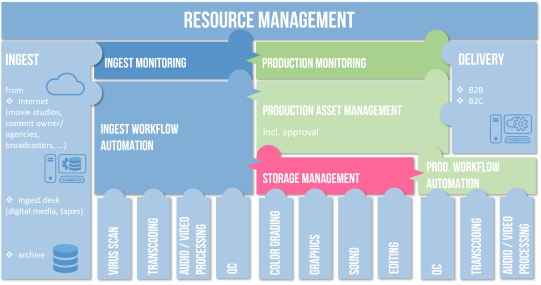
Within post-production, we distinguish between purely creative work and operational business processes that can be machine-assisted or even fully automated.
Concerning source material ingest please have a look at our Ingest Master-Solution.
Once sources are available to the creatives, the core post-production workflow starts with colour grading, graphics, animations, editing, sound, dubbing, mastering and finally subtitling. This might happen in multiple iterations as supervisors, directors or customers request changes prior to final approval. While this workflow is based largely on human interaction, we can still support it via our software that offers shared access to source material, intermediate work results and finally, mastered videos across teams and locations. Furthermore, it enables fluent communication again across internal and external teams as well as timezones.

Delivery workflows are usually standarised to make sure production of magazines, episodes, movies or news are being delivered in the highest, constant quality and speed. Depending on your customers' desires, you might deliver immediately or at a defined point in the future. Our solution offers both as fully automatic processes, driven by a human operator. Once delivery is set up, the deliverables are packaged from the master clip, optionally additional audio and subtitle files as well as pictures, descriptive and technical metadata can be added. Some end-customers might request an automatic QC report to be delivered along the video.

Network architecture
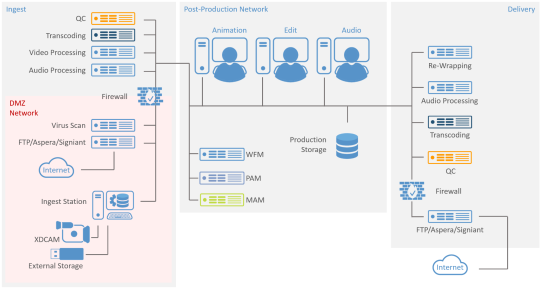
Ingest
Ingest is a topic itself. Our "All Ingest Solution" addresses all kinds of ingest. The complete solution or relevant elements from it can be an integral building block of this Post-Production end-to-end Solution. We focus here on typical ingest needs in fictional productions.
Central Ingest Station
The Central Ingest Station is the main place for ingest operations. It's usually located in a room where all new content is brought to. A number of dedicated workstations are used by a team of ingest specialists to move the files from recent shootings at various storage devices into the post-production environment. While doing so, files are previewed, selected, pre-cut and stitched. Technical metadata is automatically generated and descriptional metadata is added manually. The product used for this function is Woody IN2IT Access. It can transcode and re-wrap the files to the platform-internal format.
A variant of central ingest is offered when the source devices are attached to a server or files are being moved there before the ingest operations. In this case, Woody IN2IT Exchange is the right choice. Most often via watchfolders new files are detected and automatically ingested with standard metadata. If metadata is to be manually set Woody IN2IT Access can act as a client to IN2IT Exchange.
In other cases the need is more about starting an automatic workflow for a bunch of files. In this case x-dream-media's Workflow Starter allows you to remotely browse, preview, select, and segment video files via a WebGUI. Compared to Woody's IN2IT, the x-dream-media Workflow Starter sends the files for processing to x-dream-media's Workflow Manager (WFM). WFM orchestrates transcoding, re-wrapping, QC, virus scanning, and other operations. It's usually used to manage larger amounts of material.
Tape Ingest
Even though tape might be dead, archives often still consist of tapes. Sometimes tapes are still used in production or for transportation. Consequently, our ingest solution addresses this by making use of Libero Systems Ingest software in combination with Woody's IN2IT Exchange.
Remote Contributors
External contributors might require high-resolution video files if they are providing special effects, graphics, or low resolution for subtitles or translation. In return, they will send their work results as a source to post-production. Some contributors may have a permanent engagement while others may provide essences only occasionally and in smaller volumes, but the number of individual contributors might be very high. Therefore, a simplified way to up and download video files with related metadata is required. Tools have to be accessible globally and intuitive to use. We address this need by "upload and download rooms". Technically these rooms are a website that takes or provides the essence file and requests or provides mandatory and optional metadata. The contributor either has access to his up or download room as they are a permanently registered user or they get invited by an operator to a temporary room. The essences, qualities, and functions within their room can be limited and all activity is logged.
Processing
After files and metadata have been ingested, fully automated actions can take place, such as transcoding and re-wrapping to a house format or browsing proxies, quality control, audio processing (e.g. normalising), or video processing (e.g. standard conversions). Finally, assets (files + metadata) are handed over to the production system(s). For instance, while a high-resolution file is moved and checked into the production asset management system Projective Strawberry. Optionally, assets can be sent and checked in to a media asset management or archive management system by Flow Works. Squared Paper's Busby is the backbone of our post-production solution. It orchestrates and processes the end-2-end workflows. Built-in user interfaces or x-dream-media's OneGUI provide an overview of any volume of ingested assets.
Post-Production
Post-production is a creative process that cannot be automated but can be streamlined by software assistance. Various production steps such as colour grading, animations, graphics, editing and audio mixing are performed. Projective Strawberry acts as Storage Management System (SMS) and keeps all essences, that are part of a production project, under control as a Production Asset Management system (PAM) does. It gives shared access to the essences, protects the sources but also keeps track on editing versions. It is fully integrated into various audio and video editing and mastering applications via panels or client applications.
Remote Editing
More often post-production teams are distributed and work from homes is requested. Strawberry provides remote access to the projects essences via cloud hosted mezanine copies of the sources. The remote users experience is the same as his colleague enjoys at the post-production facility. If he adds local content to the projects editing timeline this files are immediately synchronized to the central instance.
Approval
Certain productions strictly follow a well-defined production process that consists of manual creative work, automatic processing, and human interaction. Such business processes can be "implemented" within Strawberry. An operator collects all essences that belong to production and kicks off a production workflow job. The system will then notify the operators about work to be performed and will take over again with automatic actions once manual work has been finished. It will notify other operators about the next bit of manual work to be performed, will continuously inform supervisors about the progress and will finally ask directors for the final sign off. Notifications usually take place via email but can happen within the system as well. All interaction is tracked within the system.
Content Delivery
Ultimately, approved productions have to be delivered to the B2B customers. As customers might differ in what formats they accept, some require more file processing (e.g. transcoding, loudness correction) prior to files being sent. Some might request a QC report as part of the deliverables. Finally, a high volume of video files and metadata needs to be sent via a safe, secure and guaranteed method.
And what about geographically distributed post-production environments?
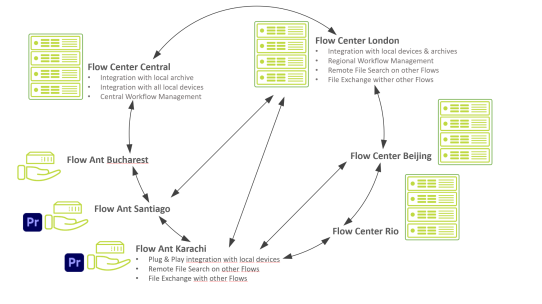
Remote Facilities
Staff in remote offices or production facilities require tight integration into the systems of the main facility to be as productive as possible. Larger facilities can be equipped as the main facility. Smaller facilities are provided with a fully featured but smaller scale system. In both cases, the users interact with a local system. Assets can be searched and actions can be triggered globally. The system will take care of the users commands in the background by sending and retrieving the files and metadata to and from the main or smaller facilities, in or out archives, and then to the final customer.
Services Architecture

The Production Management System (PMS) is the heart of content aggregation within our solution. The PMS we've selected is Squared Paper's Busby. For customers with distributed organisations, the PMS can be deployed at every facility and connected to act as one global system.
The Storage Management System (SMS) is the engine behind the scenes. It also acts as a Production Asset Management system (PAM). For these core functionalities, we've selected Projective's Strawberry. It manages the relationship between files, customers and editing suites. Consequently, every customer can access their files from every editing suite from every creative application. This is true freedom!
Optionally, a Media Asset Management System (MAM) receives, archives and publishes the production results. We provide Flow Work's Flow Center as a Swiss Knife for B2B and B2C content monetisation platform.
Post-Production Solution partners
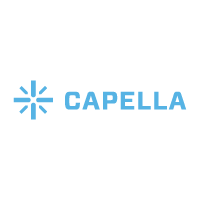
File transcoding
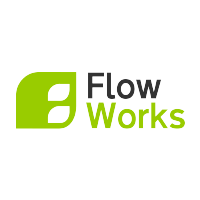
Production asset management system

Editing storage management system
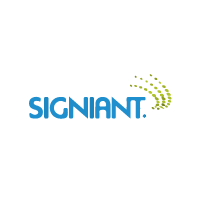
B2B file transfer

File and metadata ingest

Ingest file processing




